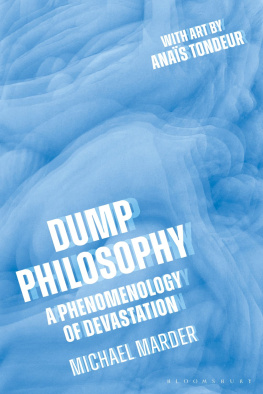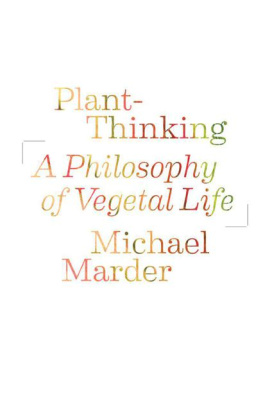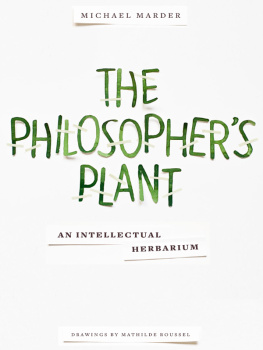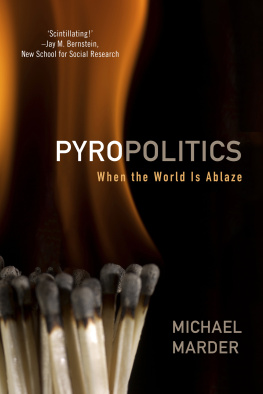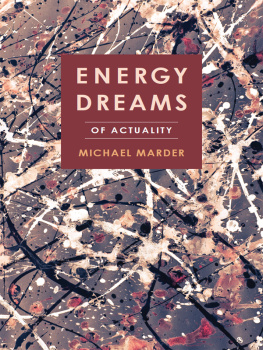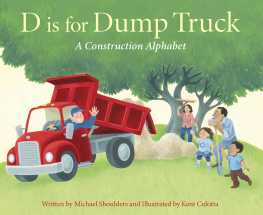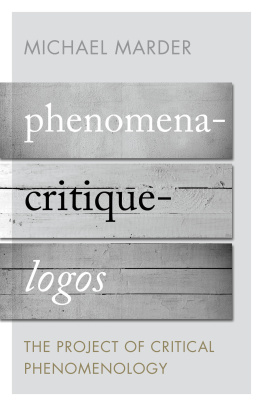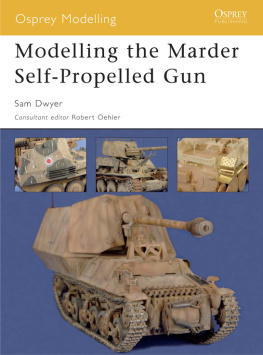Michael Marder - Dump Philosophy
Here you can read online Michael Marder - Dump Philosophy full text of the book (entire story) in english for free. Download pdf and epub, get meaning, cover and reviews about this ebook. year: 2021, publisher: Bloomsbury UK, genre: Romance novel. Description of the work, (preface) as well as reviews are available. Best literature library LitArk.com created for fans of good reading and offers a wide selection of genres:
Romance novel
Science fiction
Adventure
Detective
Science
History
Home and family
Prose
Art
Politics
Computer
Non-fiction
Religion
Business
Children
Humor
Choose a favorite category and find really read worthwhile books. Enjoy immersion in the world of imagination, feel the emotions of the characters or learn something new for yourself, make an fascinating discovery.
- Book:Dump Philosophy
- Author:
- Publisher:Bloomsbury UK
- Genre:
- Year:2021
- Rating:3 / 5
- Favourites:Add to favourites
- Your mark:
- 60
- 1
- 2
- 3
- 4
- 5
Dump Philosophy: summary, description and annotation
We offer to read an annotation, description, summary or preface (depends on what the author of the book "Dump Philosophy" wrote himself). If you haven't found the necessary information about the book — write in the comments, we will try to find it.
Dump Philosophy — read online for free the complete book (whole text) full work
Below is the text of the book, divided by pages. System saving the place of the last page read, allows you to conveniently read the book "Dump Philosophy" online for free, without having to search again every time where you left off. Put a bookmark, and you can go to the page where you finished reading at any time.
Font size:
Interval:
Bookmark:

Dump Philosophy
Also Available from Bloomsbury
Dust , Michael Marder
Searching for the Anthropocene: A Journey into the Environmental Humanities , Christopher Schaberg
The Green Light: A Self-Critique of the Ecological Movement , Bernard Charbonneau
Philosophical Posthumanism , Francesca Ferrando
Posthuman Glossary , Rosi Braidotti and Maria Hlavajova
Dump Philosophy
A Phenomenology of Devastation
Michael Marder
with artworks by Anas Tondeur

for David Buckel, in memoriam
Contents
This book has been in the making over the last five years, even as the world has been disintegrating at an accelerating pace. Some of the textual materials gathered here have been published, in an embryonic form, elsewhere. An earlier version of The Portrait of a Thing as Its Own Wastebasket appeared as Being Double in Cabinet Magazine s special issue on containers (Nr. 60, Winter 201516). Our Polluted Senses was initially published under the same title in The New York Times The Stone section on October 9, 2017. A version of Chapter 16 was published as The Writing Dump in American Book Review , 39(5), July/August 2018, pp. 1014. Finally, elements of Chapters 1, 8, and 9 appeared in Environmental Humanities as Being Dumped, Environmental Humanities , 11(1), May 2019, pp. 180193. All these texts are reproduced with the permission of copyright holders.
The photographs of the series Carbon Black_Cruz Quebrada were realized by means of a protocol developed during Anas Tondeurs artist residency at the European Commission Research Centre (JRC) in Ispra with the involvement of climate modelers Rita van Dingenen & Jean-Philippe Putaud.
.
Every day, scientific studies, media reports, and visceral experiences of the rapidly deteriorating state of the environment hit us with a growing and disconcerting force. In drinking water, microplastics abound, and, by 2050, the total mass of synthetic, human-made materials in the oceans is predicted to surpass that of fish biomass. Megalopolises on different continents languish under a stew of airborne toxins during the intensifying and protracted periods of extreme smog. Forest fires consume large swathes of wooded land, due to a combination of rising global temperatures, droughts, monoculture plantations, and meager investments into (as well as the unwillingness to rely on local knowledges for) fire prevention. Topsoil degradation, threatening the health and fertility of the earth, entails acidification, sharp increases in salinity, and toxicity, coupled with diminishing nutrient capacity and oxygen availability to plant roots.
Preoccupying as these raw empirical trends are in their own right, they are also indicative of a subtler alteration in the delicate conditions that have been up until now sustaining life on the planet. Water, air, earth and even fire (the four classical elements that, though they admit further additions, are shared by disparate philosophical and mythic The image of water that automatically forms in the mind of a person hearing the word rarely includes plastic debris, cadmium, mercury, lead, coliform bacteria, and petroleum hydrocarbons. Thinking of air, we do not usually associate it with sulfur dioxide, nitrogen oxides, and particulate matter from forest fires or coal-powered factories. The meaning of soil does not tend to encompass heavy metals, phosphates, inorganic acids, pesticides and nitrates, polynuclear aromatic hydrocarbons, polychlorinated biphenyls, chlorinated aromatic compounds, detergents, and radionuclides. Whereas some of the elemental changes are visible (for example, those manifest in photochemical smog), a vast majority elude our senses and do not figure in the sphere of cognition.
The balance between the rule and the exception has tipped. Compared to the not-so-distant past, when the worry was about geographically circumscribed pockets of pollution, the regular environmental conditions nowadays are such that clean air, soil, and water deviate from the norm. We are yet to catch up with the strange reality the unintended cumulative consequences of our technologies and economies have spawned. Drawing near the current condition of water and other elements in thinking would satisfy infinitely more than the demand for accuracy that would culminate in an adequate representation of the altered object and a mental adjustment on the part of the subject. With such a sobering adjustment, we would also do justice to the rapidly vanishing, if not already vanished, world.
Though philosophy begins in wonder, it may end in dread. When profound enough, both of these affective states shake whomever is in them to the core. Contrary to the complacent perspective on the world according to the prefabricated structures of understanding, philosophy at its most radical is an encounter with existence, which comes to pass in an atmosphere of an acutely felt dearth of understanding, as if one has not experienced that which is so encountered before. It is this feature that immunizes philosophers (I mean philosophy not as a profession but as a vocation, a calling, a dedication, a way of life even) to a kind of jadedness, to familiarity with ones surroundings, seemingly undeserving of as little as a side glance. It is also this quality that imbues the philosophical attitude with a childs joy and curiosity or, on the opposite end of the emotional spectrum, with fear and caution in the face of the unknown. Among possible reactions to the latest transformations in the environmental elements and conditions, a benumbed business-as-usual approach, fostered by governments, corporations, and dominant ideologies, is not a viable option. Philosophys flair for arranging an unparalleled rendezvous with the world is indispensable today, because we are confronted with a largely unknown world, sculpted by the lingering effects of industrial activity, for the first time in the twenty-first century.
In Dump Philosophy , I tap into the disciplines unique strength of switching on an unorthodox vision of reality and propose to take stock of what the earththe earthly fold synecdochically combining the rest of the natural elementsis, what it has become. I begin with the hypothesis that our planet is at an advanced stage of being converted into a dump for industrial output and its by-products, not to mention for consumerism and its excesses. The release of huge volumes of carbon dioxide into the atmosphere and the indiscriminate use of plastic bottles, bags, fishing nets, food wrappers and containers now ubiquitous in marine ecosystems are sufficient to qualify as dumping . Separate from these practices in space and time, their residues are no longer insubstantial traces in the air or in the water, but forces that reshape habitats, climates, and elemental milieus.
Assuming that we are not placated by clichs about the embeddedness of our lives and bodies in the environmental context, with which we are mutually constituted, we will be quick to discover that the environments becoming-dump bears directly on our existence. Our diets, sensory possibilities, and statistically prevalent diseases (cancer, cardiac and respiratory ailments, diabetes, and so forth) are under such a powerful sway of the elemental mutation that corporeality, the physical or physiological fact of embodiment, is implicated in the workings of the dump. If we further subscribe to the view of the mind integrated into, rather than split from, the body, then we will see that the vicissitudes of corporeality have a profound influence on our ways of thinking. Ideas boil down to soundbites and buzzwords arranged in chains of free association; the flood of information submerges perception and cognition alike. The mind is no less affected than the body by the elemental mutation it has helped instigate. The dump penetrates the very fibers of our being, the processes and events that make us who we are: our humanity, animality, and vegetality, our reasoning and organicity, sensation and perception, nutritive, emotive, and discerning capacities. Becoming entrenched in multiple registers of existence, it scrambles them, reproducing the effects it has had on the environmental elements.
Font size:
Interval:
Bookmark:
Similar books «Dump Philosophy»
Look at similar books to Dump Philosophy. We have selected literature similar in name and meaning in the hope of providing readers with more options to find new, interesting, not yet read works.
Discussion, reviews of the book Dump Philosophy and just readers' own opinions. Leave your comments, write what you think about the work, its meaning or the main characters. Specify what exactly you liked and what you didn't like, and why you think so.

